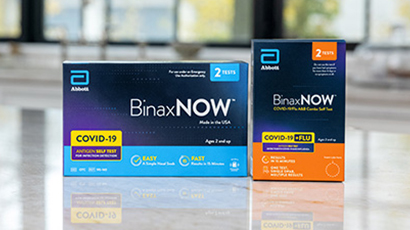Global Point of Care



ALL ABOUT covid-19
COVID-19 (coronavirus disease 2019) is an infectious respiratory disease caused by a virus called SARS-CoV-2. The disease is transmitted person to person via respiratory droplets sent into the air by anyone nearby and infected who coughs, sneezes, or talks. The result can be mild to severe respiratory illness with symptoms that can feel like a cold, the flu, or pneumonia.
Because it’s so contagious, it’s important to get tested as soon as possible if you have symptoms or think you’ve been exposed to COVID-19.
Find a test provider with ID NOW rapid molecular testing for more information.
Recognizing COVID‑19 symptoms
COVID-19 symptoms overlap with those of other respiratory illnesses. Because of that and the fact that it’s highly contagious, it’s critical to get tested once symptoms appear or you learn you’ve been exposed to someone with COVID-19.
It’s important to know that a person with COVID-19 can have a variety of symptoms or none at all. Symptoms may show up between 2 to 14 days after exposure to the virus.1 Just because you don’t have symptoms doesn’t mean you don’t have the virus and can spread it to others.
The good news is that most people infected with the SARS-CoV-2 virus will experience only mild to moderate respiratory illness and recover without needing special treatment.2
Common symptoms of COVID-191
- Fever or chills
- Sore throat
- Cough
- Runny nose
- Congestion or stuffy nose
- Headache
- Muscle or body aches or pains.
- Feeling tired
- Shortness of breath or difficulty breathing
- New loss of taste or smell
- Nausea or vomiting
- Diarrhea
Experiencing symptoms?
If you or someone close to you has typical COVID-19 symptoms, rapid testing can provide information quickly. Rapid tests can identify the COVID-19 virus so the right treatment can get started early. This may help you feel better sooner.
FOR SOME PEOPLE COVID-19 COMPLICATIONS CAN BE SERIOUS
While most people with COVID-19 will have only mild to moderate illness, there are exceptions. Some people may develop severe COVID-19 symptoms that require hospitalization.2
If you or someone you care about has chronic or severe underlying medical conditions, there is increased risk for severe effects from COVID-19.3 And, of course, as people age, their immune system tends to weaken, making people more vulnerable to infections.3 Prompt medical attention may be required.1
Targeted COVID-19 treatment begins with a quick diagnosis.
If you or someone you care about has COVID-19 and is at high risk of becoming very sick from the disease, your healthcare provider may prescribe antiviral treatment.4,5,6 Antivirals work best when they are prescribed and taken quickly, at the onset of symptoms.
Early, rapid testing—whether taken at home as a self-test or by a test provider—is essential. It ensures that you and your healthcare provider get quick and reliable results to make the most informed treatment decision.7
Contact your clinician immediately about available treatment options if you have tested positive for COVID-19.
IS IT COVID-19 OR THE FLU?
Do you have a sore throat or cough? A stuffy or runny nose? It could be a cold. It also might be COVID-19 or the flu. They all share similar symptoms. Testing is the best way to figure out what kind of infection you have and the best treatment for you.
Rapid molecular tests (ISOTHERMAL/PCR TECHNOLOGY)
Rapid molecular tests detect viral RNA or DNA with results available in minutes.
- Performed via a nasal or throat swab
- Used at the point of care by a trained operator including doctors’ offices, urgent care, emergency departments, and pharmacies
- Provide results in less than 12 minutess
Molecular PCR test
Molecular PCR tests detect viral RNA or DNA.
- Performed via a nasal, nasopharyngeal or throat swab
- Samples sent to a lab or hospital to run on a larger instrument together with higher volumes of patient samples.
- Results are typically available in 1-3 days
Rapid Antigen Self Test
Detects active infection by identifying a protein from the virus or bacteria that causes that infection.
- Performed via nasal or throat swab
- Can either be used at doctors' offices, urgent care, emergency rooms, pharmacy clinics, or bought at retailers for self-testing.
- Results available in less than 15 minutes.
What is the difference between Isothermal and PCR molecular tests?
A molecular test can find tiny amounts of virus genetic material called RNA and can be more reliable in the early stage of infection when there is less of the virus present. Isothermal and PCR are both types of molecular test technology, but isothermal tests are faster and can provide results in minutes.8,9
| Isothermal | PCR |
Tests for SARS-CoV-2 RNA |  |
|
Molecular test |
|
|
Swab from the nose |
|
|
Takes less than 15 minutes |
|
Whether it’s negative or positive, be sure to discuss your test result with your clinician.


IS IT COVID-19 OR THE FLU
Do you have a sore throat or cough? A stuffy or runny nose? It could be a cold. It also might be COVID-19 or the flu. They all share similar symptoms. Testing is the best way to figure out what kind of infection you have and the best treatment for you.
Rapid molecular tests (ISOTHERMAL/PCR TECHNOLOGY)
Rapid molecular tests detect viral RNA or DNA with results available in minutes.
- Performed via a nasal or throat swab
- Used at the point of care by a trained operator including doctors’ offices, urgent care, emergency departments, and pharmacies
- Provide results in less than 12 minutess
Molecular PCR test
Molecular PCR tests detect viral RNA or DNA.
- Performed via a nasal, nasopharyngeal or throat swab
- Samples sent to a lab or hospital to run on a larger instrument together with higher volumes of patient samples.
- Results are typically available in 1-3 days
Rapid Antigen Self Test
Detects active infection by identifying a protein from the virus or bacteria that causes that infection.
- Performed via nasal or throat swab
- Can either be used at doctors' offices, urgent care, emergency rooms, pharmacy clinics, or bought at retailers for self-testing.
- Results available in less than 15 minutes.
What is the difference between Isothermal and PCR molecular tests?
A molecular test can find tiny amounts of virus genetic material called RNA and can be more reliable in the early stage of infection when there is less of the virus present. Isothermal and PCR are both types of molecular test technology, but isothermal tests are faster and can provide results in minutes.8,9
| Isothermal | PCR |
Tests for SARS-CoV-2 RNA |  |
|
Molecular test |
|
|
Swab from the nose |
|
|
Takes less than 15 minutes |
|
Whether it’s negative or positive, be sure to discuss your test result with your clinician.


READ MORE ABOUT RAPID Testing

BINAXNOW™. KNOW NOW
During the early stages of the pandemic, we helped pioneer the technology used on the frontlines to test for COVID-19. Now that same technology is available to you in a convenient at-home self test. You can choose between testing for COVID-19 only or COVID-19 and Flu combined.

ALL ABOUT RESPIRATORY ILLNESSES
Learn about respiratory illnesses and the newer advanced test technology that offers fast and accurate results. Knowing now means you’ll be treated earlier which can help you get well sooner.

FIND THE BEST TEST FOR YOU
Rapid tests are essential tools to help diagnose what’s behind your symptoms, so you can treat earlier and get well sooner. Understand the differences between rapid molecular tests and at home COVID-19 antigen self tests.
REFERENCES
- Symptoms of COVID-19. https://www.cdc.gov/covid/signs-symptoms/index.html. Updated Aug. 13, 2024. Accessed Aug. 13, 2024.
- Coronavirus disease 2019 (COVID-19). https://www.mayoclinic.org/diseases-conditions/coronavirus/symptoms-causes/syc-20479963. Accessed Aug. 13, 2024.
- People with Certain Medical Conditions. https://www.cdc.gov/covid/risk-factors/?CDC_AAref_Val=https://www.cdc.gov/coronavirus/2019-ncov/need-extra-precautions/people-with-medical-conditions.html. Updated Aug. 13, 2024. Accessed Aug. 13, 2024.
- What Are the Possible Treatment Options for COVID-19? https://aspr.hhs.gov/COVID-19/Treatments/Pages/Possible-Treatment-Options-for-COVID19.aspx#oral-antivirals. Accessed Aug. 14, 2024.
- HHS Therapeutics Team. Side-by-Side Overview of Therapeutics Authorized or Approved for the Prevention of COVID-19 Infection or Treatment of Mild-Moderate COVID-19. https://aspr.hhs.gov/COVID-19/Therapeutics/Documents/side-by-side-overview.pdf. Accessed Aug. 13, 2024.
- Underlying Conditions and the Higher Risk For Severe COVID-19. https://www.cdc.gov/covid/hcp/clinical-care/underlying-conditions.html. Accessed Aug. 14, 2024.
- COVID-19 Treatments and Medications. https://www.cdc.gov/covid/treatment/?CDC_AAref_Val=https://www.cdc.gov/coronavirus/2019-ncov/your-health/treatments-for-severe-illness.html. Updated Aug. 13, 2024. Accessed Aug. 13, 2024.
- Types of Covid-19 tests. https://biodesign.asu.edu/clinical-testing-lab/types-of-covid-19-tests/. Accessed Aug. 14, 2024.
- Everitt ML, Tillery A, David MG, et al. A critical review of point-of-care diagnostic technologies to combat pandemics. https://www.ncbi.nlm.nih.gov/pmc/articles/PMC7548029/. Accessed Aug. 13, 2024.



